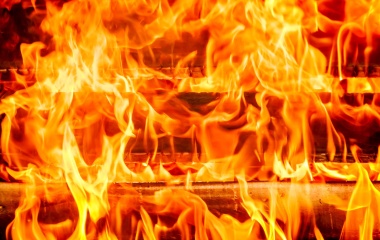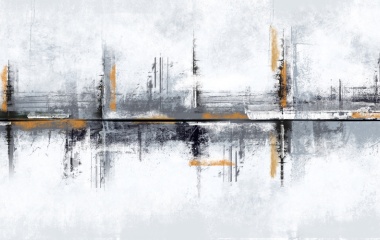
Tisha b’Av is the day of national Jewish mourning. It was on this day that “our House was destroyed, our Temple was burned, and we were exiled from our land" (Gittin 56a). It was on this day that both Temples were destroyed, the day that during the Bar-Kochba revolt the city of Beitar was captured and its many inhabitants killed, and the city of Jerusalem was “plowed over”. Our Sages trace the origins of Tisha b’Av to the sin the of the spies, or more precisely, the failure of the Jewish people to have the courage to follow the advice of Yeshoua and Calev.
As a day of national mourning the laws are patterned after those of private mourning, but in reverse. While for an individual the mourning becomes less intense as time passes (one could not live otherwise), for a nation the longer one is in exile the greater the loss, the greater the yearning and the greater the pain. How long can such a situation continue? Hence for an individual mourner one moves from the laws of anninut before the burial where one is so broken that there can be no relationship with G-d and one is forbidden to perform mitzvot, to the laws of shiva, itself divided between the first three and the last days, the 30 day mourning period and finally the 12 months of lesser mourning for a parent.
However, nationally we begin with the three weeks, increase the mourning during the nine days, the week of Tisha B’av (which with Tisha b’Av being on Sunday we did not have this year) and culminating in Tisha b’Av itself which has many of the laws of shiva, adding the prohibition of food.
Death is part of life, part of G-d’s creation, and hence one must continue to eat during shiva – the first obligation of a mourner is eating a meal immediately after the burial. But it is not natural to be in exile for 2,000 years. Once a year we pause and may not even eat – it’s as if we no longer care about ourselves as long as our nation is suffering.
Jews do not mourn for the purpose of mourning only. Mourning is meant, as Rav Soloveitchik explains, to inspire us to reflect and repent. Staring death in the face we are made more cognizant of our mortality and hence it is hoped we will take life more seriously.
It stands to reason that when one mourns for an individual it is personal aspects of one’s life that one must examine. One must learn from the best qualities of the deceased and try to apply them to one’s own life. When the mourning is for the nation then the focus must shift to areas of national failings. Yet with the destruction of the Temple and subsequent exile of the Jewish people such was not fully possible until the re-establishment of the State of Israel in 1948.
Our Sages propose no less than 10 “reasons” for the destruction of the Jerusalem and/or the loss of the Temple. Our Sages were not prophets and hence could not know the thoughts of G-d, “My thoughts are not your thoughts” (Yishayahu 55:8). It would be the height of arrogance and hubris to claim that it was this or that sin that led to the destruction of the Temple. Only “fools and children” dare to offer prophecy in an age where there are no prophets (Bava Batra 12b). All the Sages could do is offer lessons to learn from the tragedies of Jewish history.
When our Sages say Jerusalem/The Temple was destroyed because of…they were not talking about the historical Temple of 586 BCE or 70CE. They were talking about the destruction taking place in their own time. “Any generation in which the Temple is not rebuilt in its days—it is considered as if that generation destroyed it” (Jerusalem Talmud Yoma 1:20). If we have not merited building the Temple then that means that had we actually been alive when the Temple was standing our behaviour would have caused it to be destroyed. Every generation and every place has its own “bad behaviour”. Hence each Sage is talking to their generation and urging the people to focus on improving the particular failing of their time[1].
With the loss of Jewish sovereignty and most Jews living in exile the focus of our Talmudic Sages was on sins of a more individual nature. There was little a Jew living in Sura or Pumpedita could do about the proper functioning of the judicial system[2].
Yet our generation no longer has the “luxury” to look only inwards, at ways to improve ourselves. Blessed and granted the historic opportunity to create and develop a Jewish State we must broaden our perspective and think of what mistakes the nation dare not make. There are, sadly, no guarantees that the creation of the State of Israel cannot, G-d forbid, be undone. It may not actually be the “beginning of the flowering of our redemption”. This was the message Yirmiyahu delivered some 2,600 years ago and we ignore it today at our peril.
The oldest of all kinot is the kinah of Yirmiyahu over the death of Yoshiyahu. His greatness was such that Yirmiyahu compares him to Moshe Rabbeinu. He eradicated much – but unknown to him, not all – of the idolatry rampant in the land. Yet as we read this morning, he made a fatal mistake, one Yirmiyahu warned him to avoid. The Egyptians sent a peaceful message to Yoshiyahu asking to pass through the land on the way to battle the Babylonians. Yirmiyahu told him to say yes. Yet Yoshiyahu ignored his advice. He was convinced his great righteousness allowed him to prevent a foreign nation from passing through – even if they were asking to do so peacefully. So convinced, that he was willing to go to war to prevent their passage. That mistake caused, as the kinah notes “the death of multitudes”, his own death, and some 22 years later the destruction of the Temple.
In retrospect it is hard to imagine what this otherwise great king was thinking. How could he ignore the warnings of a prophet? Did he really think little Israel could defy a super-power? Tragically, Yoshiyahu had this conception that they were all powerful and could ignore the warnings they received. And that conception – against the evidence staring one in the face – led to destruction.
Our Sages teach that there were thousands, nay millions of prophets, kiflayim kyotzei mitzraim, double the amount of people who left Egypt, but only those who have a message for all generations were recorded for posterity (Megillah 14a).
Tisha B’Av is not only, or even primarily, a day we mourn the tragedies of the past. It is a day to examine the present so we do not repeat the mistakes of the past. May we learn well.
[1] Amongst the “reasons” given are the violation of Shabbat, deemphasizing education of the youth, not conducting business dealings honestly (Shabbat 119b), insisting on every legal right and not willing to go beyond the letter of the law (Bava Metzia 30b) and the most well-known of all sina’at chinam, apathy towards fellow man (Yoma 9b).
[2] It was with this theme that Moshe Rabbeinu opens up the book of Devarim, the book preparing the Jewish people for entry to the Land of Israel, and the Torah reading, for good reason, always read on the Shabbat before Tisha B’Av.



